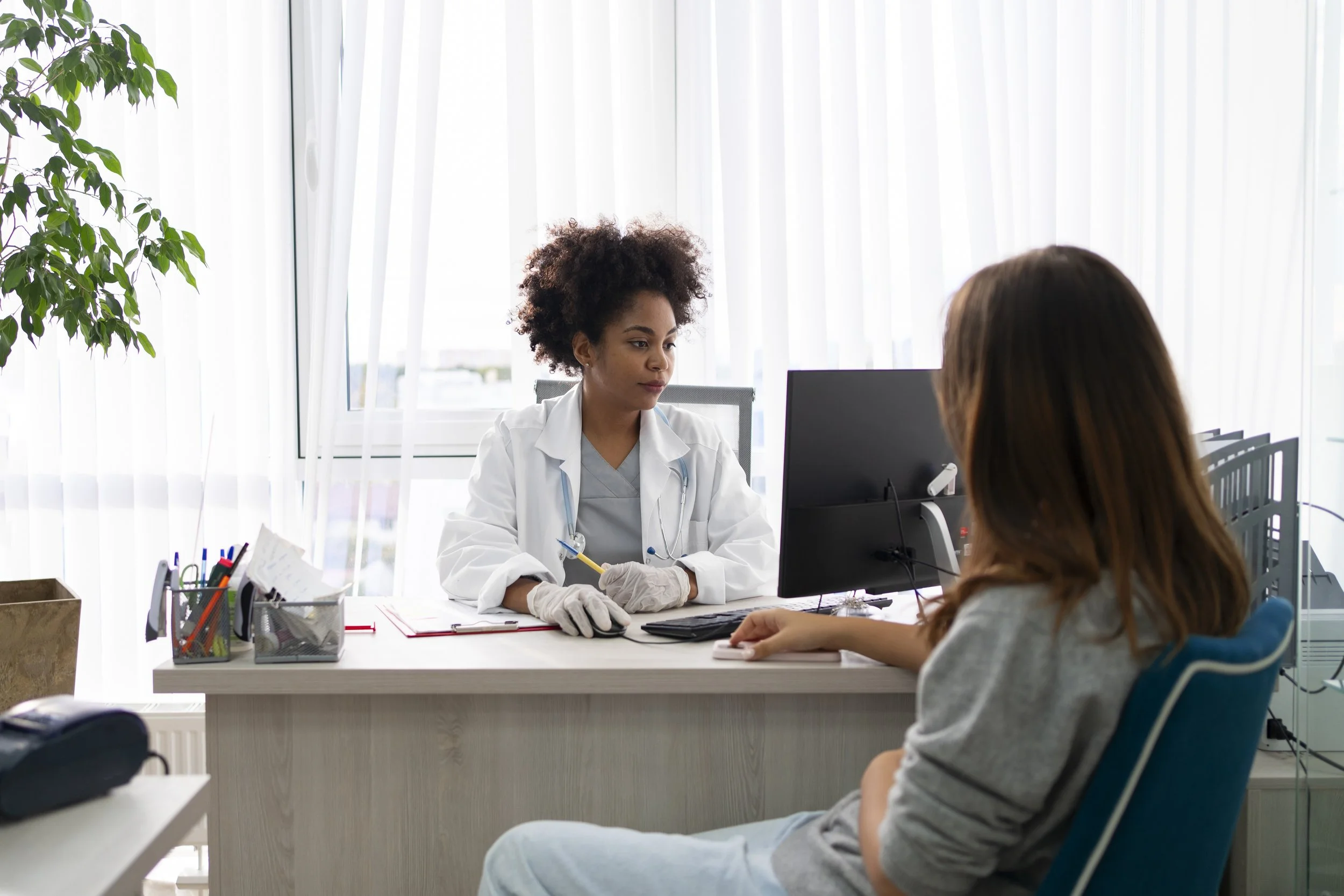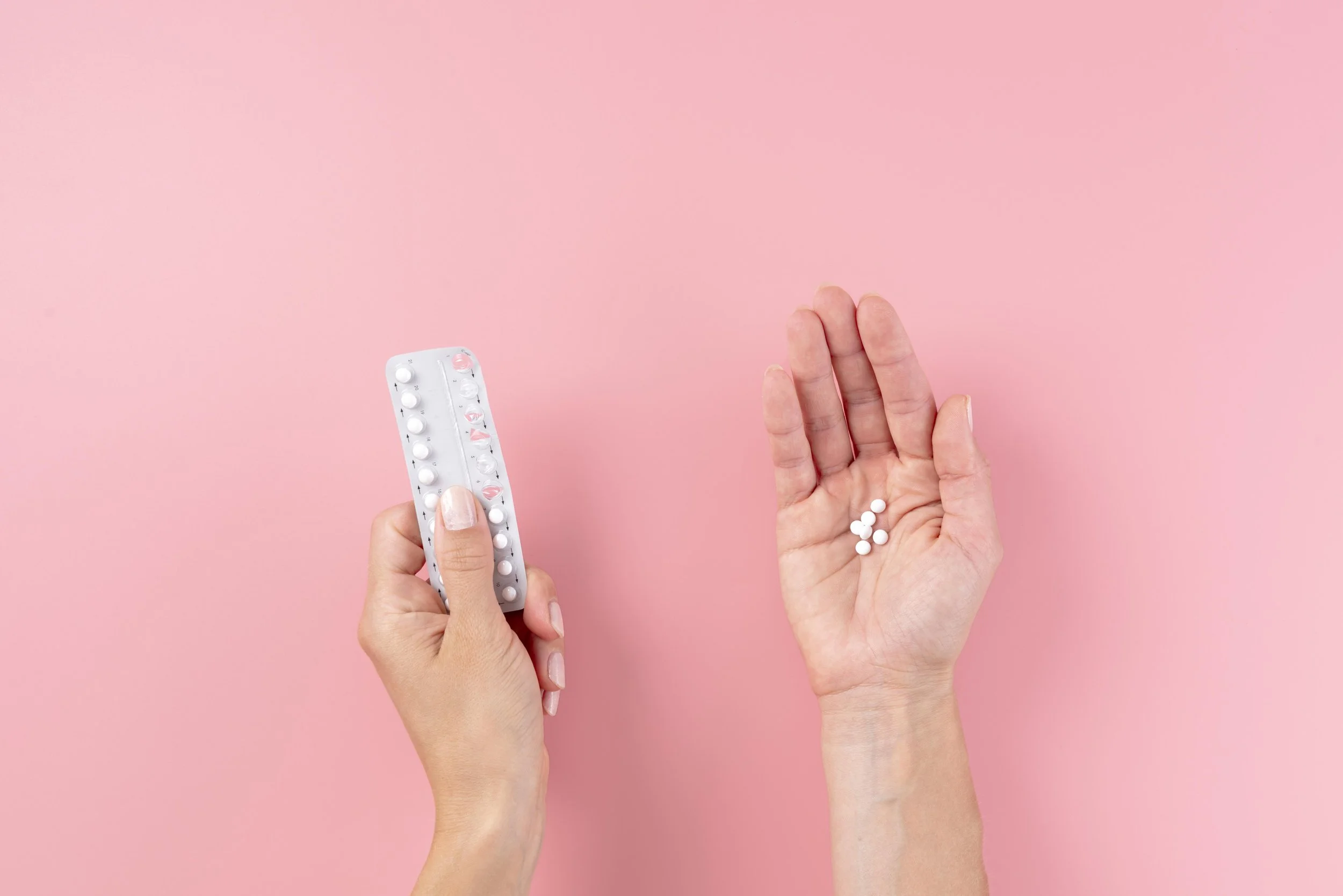Why the Pill is Not Your Only Option When You Get a PCOS Diagnosis
If your first PCOS visit ended with a prescription and a cheery “start the pill,” you are so not alone; most cysters have been handed that same script. It’s fast, it’s tidy, and yes, for many people it brings welcome relief. But it’s also incomplete.
The pill often masks the symptoms without fixing the upstream reasons they started in the first place. And you know me, I’m not into Band-Aids. I’m the look-for-the-root-cause kind of gal because I believe in long-term health.
Because that actually frees you from the cycle of symptom → prescription → repeat.
If you want a plan that leaves you with options down the road—better metabolic health, fewer meds, and the fertility choices you actually want… keep reading! Oh, and if you haven’t yet, skim Not All PCOS Is the Same first; it’ll help you see which PCOS “type” might describe you and make your next steps way clearer.
💬 Quick sidebar: this one is everywhere; in my DMs, on random Reddit threads, and plastered across social media comments. Right after the big one (“Does the pill cure PCOS?” Spoiler: nope 🙅♀️), comes the follow-up everyone whispers about but is dying to ask.
So let’s stop whispering and put it right on the table… Bye-bye, elephant in the room. 🐘
Does the pill cause PCOS?
Short answer first: No. The birth control pill does not cause PCOS.
What people call “post-pill PCOS” is almost always unmasking; the pill was covering up an underlying ovulatory or metabolic issue that reappears once you stop. The pill turns down the volume; it doesn’t retune the orchestra.
And yes, there’s often a rebound effect when you come off the pill. It’s like your body finally says, “Oh, you didn’t want to hear me before? Fine. Here’s the full volume.” Suddenly, irregular cycles, mood swings, heavy bleeding, or acne show up stronger than ever. Not fun but real.
We’ll get into how to prepare for and soften that rebound (spoiler: planning helps), but first, let’s finish unpacking how the pill actually affects your hormones.
Now the gentle, real-world explanation (Dr. K-style, with heart and science 😉):
Why people confuse “masking” with “causing”
When you take combined hormonal contraception, your ovaries mostly shut up.
No ovulation = no monthly progesterone.
The pill can also raise SHBG and lower free testosterone, which quiets acne and unwanted hair. So while you’re on it, things can look great. When you stop taking it, your body wakes back up—and any preexisting patterns (hormonal acne, irregular periods, body hair) can show up again.
Alright, Dr. K., we got it: the pill can be helpful for some things, but it’s not a root fix. Now… What does it actually do for PCOS, and what does that look like in real life?
What the pill actually “helps” with
‘Regularizes’ bleeding & protects the uterine lining. If your periods are heavy or unpredictable, the pill gives your uterus a break—think of it as a reliable calendar while you work on the why.
Lowers free androgens. often improves acne & unwanted hair. By raising SHBG and taming ovarian output, many women see clearer skin and less new facial/body hair in a few months.
Gives relatively immediate symptom relief. When your cycle or skin is wrecking your life, the pill can calm things fast. Very useful (but don’t confuse quick relief with long-term repair!)
What it doesn’t do (and why that matters)
It does not “solve” PCOS. The pill presses pause on ovulation and symptoms; it doesn’t rewind the metabolic or hormonal drivers underneath. When you stop, those patterns can return.
It does not reliably fix insulin resistance. If insulin is the engine under your PCOS, the pill won’t turn the key. Long-term change requires blood-sugar stabilization, movement, and targeted metabolic work.
Long-term use can alter nutrient status and hide the full picture. Years on hormonal contraception are associated in some people with lower folate/B12, zinc, and magnesium, nutrients important for mood, energy, and fertility. That’s not doom, but it is a reason to test and replete if you plan to stay on it.
Now here’s the part your OB/GYN probably didn’t cover in the five-minute appointment: what happens underneath the hood while you’re on the pill. Are you ready for it?
Side effects & what to watch for
Okay, friend, let’s be honest: lots of people take the pill and feel better fast. That relief? Valid. But like any powerful tool, it comes with things to notice.
Common stuff (usually chill, often temporary):
Spotting or breakthrough bleeding (your uterus is like, “uhh…what’s happening?”—usually settles in 1–3 months).
Breast tenderness, nausea, and mood shifts.
Libido changes (drive tends to decrease)
Big-ticket, less common but important things:
Blood clots (VTE): estrogen-containing pills slightly increase clot risk. Risk is higher if you smoke, are over 35, or have a personal/family clotting history. Translation: know your personal risk before saying yes.
Mood shifts: some people — especially younger users — are more sensitive to mood changes in the first months. If you feel “off,” it’s not all in your head. Your body is giving you data.
Metabolism: pills don’t fix insulin resistance, and in some cases, they may nudge glucose or lipids the wrong way. That’s why baseline labs and periodic check-ins are smart.
Cancer risks & protections:
Slightly higher risk of breast cancer while using, which fades after stopping.
Long-term use protects against ovarian and endometrial cancer. (Hormones are complicated, right?!)
I’m a functional-approach kind of gal because I’ve seen the radical, beautiful shifts that happen when women pair a healthy lifestyle with a targeted, personalized plan (yep, speaking from personal experience here 🙋🏻♀️). But this is a safe space: we listen, we don’t judge. That’s exactly why I’m handing you this little toolkit—practical, real, and totally doable—so you can feel supported and navigate this road with confidence.
Supportive toolkit while you’re on the pill
Food-first nutrient support
Eat folate-rich greens (kale, spinach, arugula), legumes, and whole foods.
Protein at every meal stabilizes blood sugar and supports hormone building blocks—aim for ~20–30 g at breakfast.
Prioritize magnesium-rich foods: leafy greens, nuts, seeds, and beans. If labs show low levels, we supplement (magnesium glycinate at night is my clinical go-to).
Daily multivitamin—a smart safety net
If you plan long-term hormone use, a quality multivitamin (or targeted B12/folate + magnesium) covers common gaps while you test and replete. Easy, low-drama insurance.
Move: gentle, purposeful activity
After meals: 20–30 minutes of walking or gentle movement to help blunt insulin spikes. Tiny habit, big payoff.
EDC hygiene (plastics and perfumes actually matter)
Swap food storage to glass. Don’t microwave in plastic. Pick fragrance-free or low-toxin personal care products when you can.
Sleep & stress (non-negotiables)
Protect 7–9 hours when possible. Two 5-minute calming practices a day (breathwork, box breathing, or a gratitude pause) help reduce adrenal androgen signaling. Sleep is where hormones repair; treat it like a pleasant medical appointment.
Track your body like a savvy scientist, not a worrier
Note mood, flow, acne, libido, energy, and any new symptoms in your phone. Bring this log to your 3-month check. Data = power.
Smart next steps for every case scenario (if you’re on the pill now—or thinking of stopping)
If you must stay on it now, use it intentionally. Check baseline labs (BP, fasting glucose/insulin if risk, lipids, B12/folate, ferritin), add a multivitamin or targeted supplements if tests show gaps, and start blood-sugar-stabilizing habits today [link to carbs blog]
If you want to break up with it, don’t ghost your provider; communicate and plan ahead so you don’t have an abrupt rebound effect. Expect up to ~3 months for cycles to re-regulate. Track your bleeding, mood, skin, and ovulation. Have baseline labs before stopping if possible, and lean into insulin-stabilizing food, cruciferous veggies for liver support, and magnesium and B-vitamin repletion as needed.
Don’t be scared; think of this as a brave, strategic investment in your future self. You’re not “losing” a safety net; you’re building a stronger one that’s rooted in the why. I promise it will be worth it: many people feel more energized, more empowered, and more prepared for whatever comes next—especially if you’re planning to conceive.
💬 If you see yourself in either camp (staying on the pill for now or ready to stop), I’d love to hear from you. My DMs are always buzzing with women navigating the same questions, and I answer as many as I can.
Bottom line: use the pill with intention
The pill can be a breath of relief for many, and it can be used safely and smartly. But it’s not a “set and forget.” Use it intentionally, monitor your body, and pair it with metabolic, liver/gut, and lifestyle work so one day you can lean on fewer tools, not more.
If anything feels off, discuss it with your clinician. And one more practical tip: before you start (or stop) the pill, run the labs I mention in this article. Bring them to your appointment and thank me later.
Daydream with me: what could happen if you tackle the root cause
Imagine this: twelve months from now you wake up to clearer skin, your period shows up on a schedule that actually makes sense, and your energy doesn’t crash at 3 p.m. You might be planning on expanding your family—or you might be happily saying, “I’m good, no more meds for now.”
That isn’t a fairy tale; I’ve seen hundreds of women achieve that. How? Pairing small, doable habits (think protein-forward breakfasts and a 20–30 minute post-meal walk), targeted supplements when labs show a need, liver and gut support, and sleep and stress. Sounds like a lot, but as soon as you start feeling like yourself again, ditching these new habits won’t even cross your mind.
Repeat after me: the pill can be helpful for some PCOS symptoms, but it’s not magic, and it’s definitely not the whole story. Treating only the surface is like sticking a band-aid on a leaky roof. Sure, it covers the drip, but if the band-aid stays there forever, the house underneath starts to rot. Yikes! Not a cute picture, right?
At the end of the day, your body deserves more than quick fixes; it deserves a strategy that actually works with it, not against it. The pill can be part of that plan, but it’s not the plan. You get to decide how your story goes, and trust me, you’re way more powerful than PCOS gives you credit for.
And hey, don’t forget, you’re not doing this solo! We’re rewriting the hormone playbook together, building a community of powerfully informed women and just a little bit sassier than PCOS expected.







